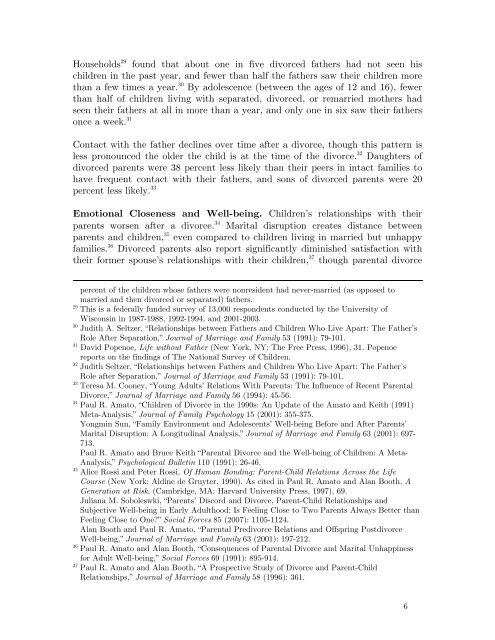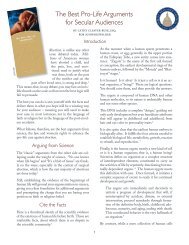The Effects of Divorce on Children - Family Research Council
The Effects of Divorce on Children - Family Research Council
The Effects of Divorce on Children - Family Research Council
Create successful ePaper yourself
Turn your PDF publications into a flip-book with our unique Google optimized e-Paper software.
Households 29 found that about <strong>on</strong>e in five divorced fathers had not seen his<br />
children in the past year, and fewer than half the fathers saw their children more<br />
than a few times a year. 30 By adolescence (between the ages <str<strong>on</strong>g>of</str<strong>on</strong>g> 12 and 16), fewer<br />
than half <str<strong>on</strong>g>of</str<strong>on</strong>g> children living with separated, divorced, or remarried mothers had<br />
seen their fathers at all in more than a year, and <strong>on</strong>ly <strong>on</strong>e in six saw their fathers<br />
<strong>on</strong>ce a week. 31<br />
C<strong>on</strong>tact with the father declines over time after a divorce, though this pattern is<br />
less pr<strong>on</strong>ounced the older the child is at the time <str<strong>on</strong>g>of</str<strong>on</strong>g> the divorce. 32 Daughters <str<strong>on</strong>g>of</str<strong>on</strong>g><br />
divorced parents were 38 percent less likely than their peers in intact families to<br />
have frequent c<strong>on</strong>tact with their fathers, and s<strong>on</strong>s <str<strong>on</strong>g>of</str<strong>on</strong>g> divorced parents were 20<br />
percent less likely. 33<br />
Emoti<strong>on</strong>al Closeness and Well-being. <strong>Children</strong>’s relati<strong>on</strong>ships with their<br />
parents worsen after a divorce. 34 Marital disrupti<strong>on</strong> creates distance between<br />
parents and children, 35 even compared to children living in married but unhappy<br />
families. 36 <str<strong>on</strong>g>Divorce</str<strong>on</strong>g>d parents also report significantly diminished satisfacti<strong>on</strong> with<br />
their former spouse’s relati<strong>on</strong>ships with their children, 37 though parental divorce<br />
percent <str<strong>on</strong>g>of</str<strong>on</strong>g> the children whose fathers were n<strong>on</strong>resident had never-married (as opposed to<br />
married and then divorced or separated) fathers.<br />
29 This is a federally funded survey <str<strong>on</strong>g>of</str<strong>on</strong>g> 13,000 resp<strong>on</strong>dents c<strong>on</strong>ducted by the University <str<strong>on</strong>g>of</str<strong>on</strong>g><br />
Wisc<strong>on</strong>sin in 1987-1988, 1992-1994, and 2001-2003.<br />
30 Judith A. Seltzer, “Relati<strong>on</strong>ships between Fathers and <strong>Children</strong> Who Live Apart: <str<strong>on</strong>g>The</str<strong>on</strong>g> Father’s<br />
Role After Separati<strong>on</strong>,” Journal <str<strong>on</strong>g>of</str<strong>on</strong>g> Marriage and <strong>Family</strong> 53 (1991): 79-101.<br />
31 David Popenoe, Life without Father (New York, NY: <str<strong>on</strong>g>The</str<strong>on</strong>g> Free Press, 1996), 31. Popenoe<br />
reports <strong>on</strong> the findings <str<strong>on</strong>g>of</str<strong>on</strong>g> <str<strong>on</strong>g>The</str<strong>on</strong>g> Nati<strong>on</strong>al Survey <str<strong>on</strong>g>of</str<strong>on</strong>g> <strong>Children</strong>.<br />
32 Judith Seltzer, “Relati<strong>on</strong>ships between Fathers and <strong>Children</strong> Who Live Apart: <str<strong>on</strong>g>The</str<strong>on</strong>g> Father’s<br />
Role after Separati<strong>on</strong>,” Journal <str<strong>on</strong>g>of</str<strong>on</strong>g> Marriage and <strong>Family</strong> 53 (1991): 79-101.<br />
33 Teresa M. Co<strong>on</strong>ey, “Young Adults’ Relati<strong>on</strong>s With Parents: <str<strong>on</strong>g>The</str<strong>on</strong>g> Influence <str<strong>on</strong>g>of</str<strong>on</strong>g> Recent Parental<br />
<str<strong>on</strong>g>Divorce</str<strong>on</strong>g>,” Journal <str<strong>on</strong>g>of</str<strong>on</strong>g> Marriage and <strong>Family</strong> 56 (1994): 45-56.<br />
34 Paul R. Amato, “<strong>Children</strong> <str<strong>on</strong>g>of</str<strong>on</strong>g> <str<strong>on</strong>g>Divorce</str<strong>on</strong>g> in the 1990s: An Update <str<strong>on</strong>g>of</str<strong>on</strong>g> the Amato and Keith (1991)<br />
Meta-Analysis,” Journal <str<strong>on</strong>g>of</str<strong>on</strong>g> <strong>Family</strong> Psychology 15 (2001): 355-375.<br />
Y<strong>on</strong>gmin Sun, “<strong>Family</strong> Envir<strong>on</strong>ment and Adolescents’ Well-being Before and After Parents’<br />
Marital Disrupti<strong>on</strong>: A L<strong>on</strong>gitudinal Analysis,” Journal <str<strong>on</strong>g>of</str<strong>on</strong>g> Marriage and <strong>Family</strong> 63 (2001): 697-<br />
713.<br />
Paul R. Amato and Bruce Keith “Parental <str<strong>on</strong>g>Divorce</str<strong>on</strong>g> and the Well-being <str<strong>on</strong>g>of</str<strong>on</strong>g> <strong>Children</strong>: A Meta-<br />
Analysis,” Psychological Bulletin 110 (1991): 26-46.<br />
35 Alice Rossi and Peter Rossi, Of Human B<strong>on</strong>ding: Parent-Child Relati<strong>on</strong>s Across the Life<br />
Course (New York: Aldine de Gruyter, 1990). As cited in Paul R. Amato and Alan Booth, A<br />
Generati<strong>on</strong> at Risk, (Cambridge, MA: Harvard University Press, 1997), 69.<br />
Juliana M. Soboleswki, “Parents’ Discord and <str<strong>on</strong>g>Divorce</str<strong>on</strong>g>, Parent-Child Relati<strong>on</strong>ships and<br />
Subjective Well-being in Early Adulthood: Is Feeling Close to Two Parents Always Better than<br />
Feeling Close to One?” Social Forces 85 (2007): 1105-1124.<br />
Alan Booth and Paul R. Amato, “Parental Predivorce Relati<strong>on</strong>s and Offspring Postdivorce<br />
Well-being,” Journal <str<strong>on</strong>g>of</str<strong>on</strong>g> Marriage and <strong>Family</strong> 63 (2001): 197-212.<br />
36 Paul R. Amato and Alan Booth, “C<strong>on</strong>sequences <str<strong>on</strong>g>of</str<strong>on</strong>g> Parental <str<strong>on</strong>g>Divorce</str<strong>on</strong>g> and Marital Unhappiness<br />
for Adult Well-being,” Social Forces 69 (1991): 895-914.<br />
37 Paul R. Amato and Alan Booth, “A Prospective Study <str<strong>on</strong>g>of</str<strong>on</strong>g> <str<strong>on</strong>g>Divorce</str<strong>on</strong>g> and Parent-Child<br />
Relati<strong>on</strong>ships,” Journal <str<strong>on</strong>g>of</str<strong>on</strong>g> Marriage and <strong>Family</strong> 58 (1996): 361.<br />
6




